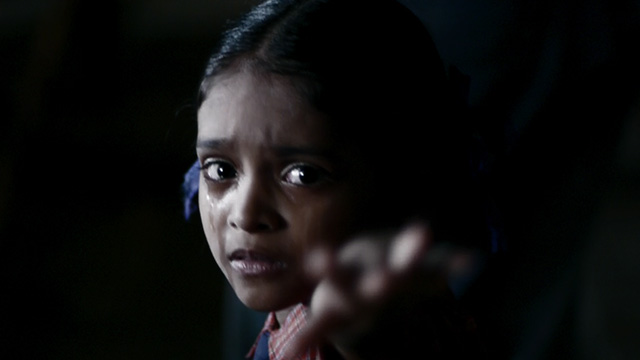
Sunrise
Written and directed by Partho Sen-Gupta
India, 2014
The despair of loss weighs down Joshi in Sunrise. Joshi works as an agent in the social services of a Mumbai police station. He handles reports of lost and trafficked children, rarely able to effect any meaningful change. After fruitless days at work, he returns to his dark apartment and his heartbroken wife who cannot accept the loss of their grade school daughter. A strange shadow figure haunts Joshi, leading him night after night to a strange club called ‘Paradise’.
With very few words, so much is conveyed in Partho Sen-Gupta’s sophomore film. Character is built through environment and performance. The film’s early scenes capture a world of great detail, brimming with textures and sounds. Shot almost entirely at night, the sparseness of light and the heavy rains of the monsoons focus our attention and transform the city into a mythical labyrinth. Adil Hussain guides us through these streets, his performance as Joshi commanding our attention – he is a man of who conveys enormous empathy. His helplessness pervades the film and never quite dissipates.
Faced with institutional failures and pervasive abuse, Joshi’s victories are hollow. As a political film Sunrise is effective, conveying the specific issue of child kidnapping (the film ends with the statistic that 100,000 children are kidnapped every year in India) but also the social circumstances that allow that to happen. The layers of violations on children’s autonomy and safety are established throughout, as the social services charged with protecting children treat them as property rather than human beings. The need to avenge the death and kidnapping of children is more akin to the treatment of stolen items.
A sixteen year old boy comes to the station night after night: He wants help from the police. His motive is not immediately clear, though one night he is beaten badly. The officer tries to send him off, it is not their business that his father beat him. The eventual reveal of why the boy was so persistent to find help is horrifying. While there are some clear villains in the film, men and women who physically and sexually abuse children, what is most jarring is how passively the exploitation of children is treated.
As Joshi navigates this world, isolated by his own sense of empathy and loss, his gaze transforms Mumbai into a living nightmare. With scenes akin to the great works of German expressionism and the master of the subconscious, David Lynch, Sunrise is a powerful work of psychological distress. The Paradise club is the centerpiece of the film’s dream world and is framed with varying coloured gels and an unnerving sense of deja vu. Situated between reality and dream, Paradise is where Joshi is faced with his greatest fears.
Partho Sen-Gupta is part of a rising movement within India of independent, politically minded filmmakers. More than anything else, Sunrise shows the promise of an artist with a great eye and a strong sense of the now. The politics of Sunrise don’t outweigh the story, and perhaps most importantly, don’t condescend to the audience.
Sunrise is screening at Fantasia International Film Festival on August 1st at 17:15

